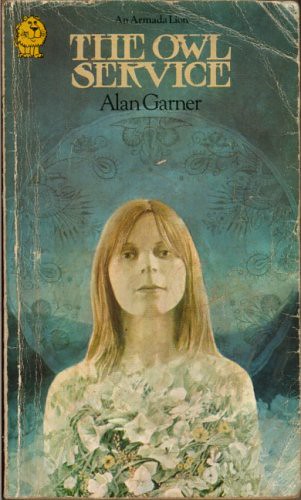 Good? Yes. Read again? Probably not.
Good? Yes. Read again? Probably not.The Owl Service: a low fantasy novel for young adults by Alan Garner, published by Collins in 1967. Set in modern Wales, it is an adaptation of the story of the mythical Welsh woman Blodeuwedd, an "expression of the myth" in the author's words. Or so says wiki. The image I've inlined, from wiki1, is the cover of the copy I have.
I enjoyed it. Bits of it are genuinely creepy / scarey and well done; I found myself slightly reading ahead to make sure it was "all right". There's a bit of social comment thrown in too; or perhaps that's the purpose.
This book feels like its part of my childhood - or at least the title is - but I'm sure I've never read it. Because my interpretation of the title, as a book about, errrm, something like a secret society, or a postal-service-via-owls, is completely wrong: the "service" refers to merely a dinner service (I give little away there, because that's revealed in the first few pages).
The book I have is "An Armada Lion" and I think that confirms the "young adult", i.e. (I presume) teenager bit. That may explain the curious-in-context total absence of sex, or sexual tension, that would naturally be present: the three key players in the story are two teenage boys and a teenage girl, and yet nothing happens or comes even close to happening along conventional teenage lines. That seemed rather odd to me; in a strange way it works, because it makes the story retain a supernatural flavour.
I found the ending confusing or unsatisfactory, and having re-read the last few pages still didn't fully understand it. Don't read this bit if you don't want spoilers. Perhaps the Author couldn't quite work it out either. The problem is: in this turn of the legend, its going to end happily: flowers, not owls. That leaves, in a sense, Alison choosing sides. The "natural" side for her to choose would be Gwyn, because he's the low-caste clever engaging character who deserves to succeed. But at the end she is unconcious; she doesn't choose; instead, Gwyn chooses by doing nothing / retaining his hate; and Roger chooses by not retaining hate. But apart from that, Roger is fairly unappealling, and his late sympathy for Gywn / Huw jars; Alison's rather forced choosing of her tennis club reads more like an author's convenience that in-character, as does Gwyn's retention of his hate.
Notes
1. Well it was wiki's, but wiki has now swapped to a different one and deleted the old one, I hate it when they do that. So it is now one from Abebooks. It is still the same pic, the on of my copy.
No comments:
Post a Comment